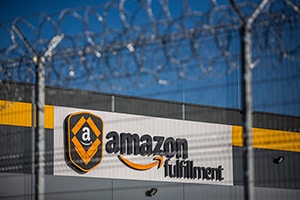by Ari Ashe, Staff Reporter, Transport Topics / A former top logistics executive at FedEx believes Amazon is not ready to take on the parcel and freight carrier yet, but suggests FedEx should have an action plan ready for a prolonged battle over on-demand logistics in the near future. /
The two companies have grown exponentially from the e-commerce revolution, with each reporting a net income between $1.5 billion and $2 billion in their latest annual reports. Net revenue for both giants has grown each of the last three years. Amazon.com Inc., based out of Seattle, crossed the $100 billion mark in 2015. FedEx Corp., based out of Memphis, Tennessee, passed $50 billion this year.
“If I were still in Memphis today on the FedEx payroll, I would be advocating to have a nuclear option on the shelf,” said Dick Metzler, director of marketing at uShip and former vice president and general manager of FedEx Logistics. “If I were at FedEx, I would be saying ‘At what point do I become convinced that they’re a competitor and take action accordingly?’ FedEx and UPS have options to impede them going forward, but they won’t have those options forever.”
Metzler, who worked at FedEx for 18 years, told listeners on a conference call, hosted by Stifel Nicolaus & Co., that top executives at FedEx and UPS are both equipped to handle the challenge. FedEx executives admitted on a June 21 conference call that they continue to get questions about the evolution of Amazon.
“Amazon continues to be a valuable customer and they’re among the largest retailers that we stay in close dialogue with throughout the year to understand their transportation needs as they continue to experience significant growth,” FedEx executive vice president T. Michael Glenn told analysts on the conference call. “Having said that, it is important to remember that no single FedEx customer represents more than approximately 3% of total revenue.”
UPS Inc., based out of Atlanta, acknowledge that e-commerce is the “growth engine of the future” on what it called a $35 trillion global business opportunity.
While Amazon is quickly becoming a large provider of transportation and logistics around the world, it is also tight-lipped about where it will go next. In April, a company spokeswoman declined to discuss specifics with Transport Topics about its future plans.
“They [Amazon] are a 1PL, 2PL, 3PL and 4PL company that could be getting ready for a real coming out party, but we will see. I think they have some decisions to make as to whether they will cross the line to compete with FedEx and UPS,” said Metzler.
The future of Amazon Prime could offer more insight into answering the questions about its future. Amazon offers free two-day shipping to customers for $99 annually, but Metzler predicts the company could introduce Prime Gold and Platinum. The two tiers could offer one-hour and two-hour deliveries in major cities for a higher annual fee.
“It’s the Amazon effect, that you and I will come to expect that [items] are delivered in one or two hours, that the world is coming to an end and I absolutely can’t live without it and start Jonesing for my next e-commerce delivery. Could it happen? Yes it could happen,” said Metzler, although he called it unlikely.
At an event to unveil the 2016 Annual State of Logistics Report from the Council of Supply Chain Management Professionals, sponsored by Penske Logistics, panelists discussed the role of how other logistics firms are working and competing with Amazon at the same time.
“Quite frankly, Amazon is going to push all of us on the service side to do a much better job, to be a little quicker to respond and provide service to the customer. It is going to stretch everybody to keep pace with them,” said Ron Marotta, vice president of the international division at Yusen Logistics.
Unmanned aerial vehicles, commonly referred to as drones, could also be a factor in Amazon’s plans. The Federal Aviation Administration released new rules June 21 that will relax the requirements on using drones weighing less than 55 pounds, allowing operators to be certified to operate the devices. The new rule takes effect in late August.
View original article

